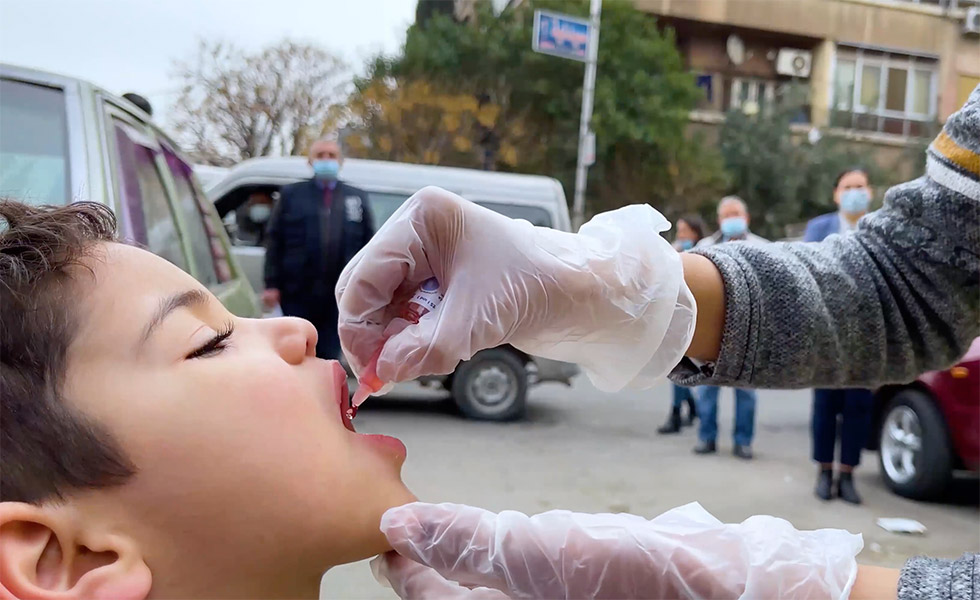 A child receives polio vaccine during the national polio immunization campaign concluded in March 2021, reaching 2.5 million children under the age of 5 in all 14 governorates of Syria, including high-risk areas of the eastern Euphrates, refugee and IDP camps, and nomadic areas
A child receives polio vaccine during the national polio immunization campaign concluded in March 2021, reaching 2.5 million children under the age of 5 in all 14 governorates of Syria, including high-risk areas of the eastern Euphrates, refugee and IDP camps, and nomadic areas
In 1999, Syria thought it had seen its last case of wild poliovirus. Robust routine immunization, provided through the country’s public health care system, ensured that children received the vaccines they needed to fight off polio. But in October 2013, polio was confirmed in Syria once again.
The 2013–2014 wild poliovirus type 1 (WPV1) outbreak, caused by the importation of a strain of WPV1 circulating in Pakistan, paralysed 35 children in 2013 and one in January 2014. Most of the children infected had not been vaccinated against polio, and as such were unable to fight off the virus.
A coordinated response by the Syrian Ministry of Health, WHO and UNICEF, including region-wide synchronized campaigns halted transmission of poliovirus and raised immunity levels. Despite operational complexities, 10 national campaigns in Syria reached 2.9 million children under age 5, and the country’s polio surveillance system was strengthened at every level.
Responding to cVDPV2 transmission
In June 2017, cases of circulating vaccine-derived poliovirus type 2 (cVDPV2) were reported in Deir Ez-Zor governorate, in eastern Syria, confirming another outbreak of polio. The outbreak would ultimately paralyse 74 children, the last on 21 September 2017. As with the previous outbreak, the context of an unimmunized population that had had suboptimal access to health care was a critical risk factor, and the outbreak was brought to a close through sustained efforts to repeatedly vaccinate every child with oral polio vaccine (OPV), despite challenges around access and ongoing conflict.
Polio surveillance in Syria
Syria has a robust surveillance system for acute flaccid paralysis (AFP). Stool specimens are collected and sent to the WHO-accredited national polio laboratory in Damascus to determine whether poliovirus infection is the cause of paralysis. Surveillance indicators reached global targets for 2019 with a detection rate of >3/100 000 children under the age of 15.
Syria also carries out extensive environmental surveillance at 16 sites in 13 governorates. While the Syrian Ministry of Health is responsible for training, supervising and managing surveillance staff, WHO provides financial support for transport, incentives for timely collection and analysis, and capacity-building.
National polio laboratory in Damascus
The national polio laboratory in Damascus carries out viral isolation and intratypic differentiation of the poliovirus, as well as genetic sequencing. The laboratory has successfully passed WHO’s annual accreditation exercise, formally confirming that the laboratory has the capability and the capacity to detect, identify and promptly report wild and vaccine-derived polioviruses that may be present in clinical and environmental specimens. WHO funded all supplies and equipment required by the national polio laboratory and supported capacity-building for senior laboratory staff through internal and external workshops, in coordination with the WHO Regional Office in Cairo.


